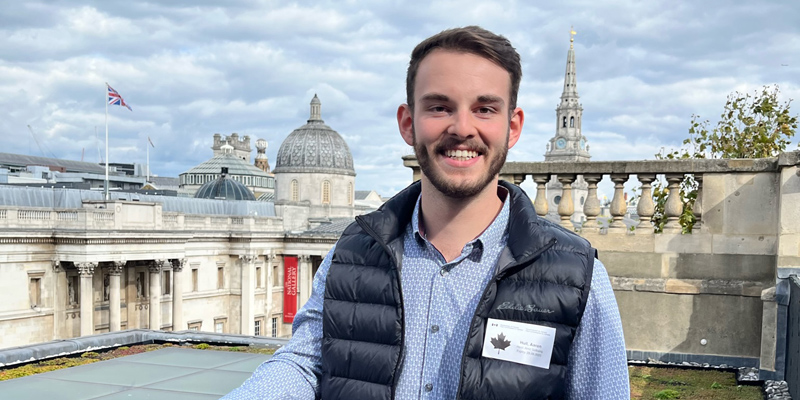Supporting startups

The third in a series of six student accounts of their commerce program work terms based at Harlow Campus.
Being someone who’s always had a keen interest in entrepreneurship, I insisted that my first work term would be with a startup.
Serendipitously, as I opened the second round of job applications, Bounce Health Innovation was offering a position to work alongside an innovative entrepreneur in Newfoundland and Labrador’s med-tech sector as they seek expansion to the U.K.
The company I was paired with, Granville Biomedical, provided a novel and unique experience I could not have gotten anywhere else.
Granville specializes in the design of anatomical teaching tools and innovative medical devices to enhance clinical practice and prioritize patient care.
With far fewer resources and staff than large corporations, startups allow employees to dabble in all aspects of business, while still focusing specifically on their area of expertise.
During my time with Granville, I have bettered my skills in marketing, sales, commercialization, international business, business communications, business management, business development, manufacturing, pricing, entrepreneurship and more.
As someone who hasn’t decided on a focus area for my studies, this has been an incredible opportunity to gauge my interest in various areas of business to better determine which path I would like to take.
Learning to pivot
There is a certain element of pride associated with working for a startup.
In corporate positions, there is a mentality that you are simply a cog in the machine; conversely, in a startup, you are the machine and everything you do is crucial to the development and success of the business overall.
Canada, and Newfoundland and Labrador in particular, has more opportunities for accessibility to hospitals in comparison to the U.K.
The National Health Service (NHS) is a very secure organization, meaning a strong network of partners is required to access anyone within the system.
Initially, our plan was to attempt to sell to the hospitals; however, without any contacts within the NHS we quickly pivoted because procurement managers, physicians and educators within the system are inaccessible.
Their contact information is kept hidden from the public eye and is difficult to access as an outsider.
Conversely, in a much smaller and more community-oriented place such as Newfoundland and Labrador, it’s far easier to connect with individuals within the health-care system who can help you access the correct hospitals to share your product with.
With patience, a forward mindset and the acceptance of innovation, the accessibility of hospitals in Newfoundland and Labrador could play a vital role in advancing our health-care system.
Initially, I had no expectations as to what cross-cultural professional challenges this position could hold. From an outside perspective of never having been to the U.K. before, I assumed culturally North America and the U.K. would be relatively the same.
As a business intern with Granville, I have mainly been involved in sales, which requires frequent communication with numerous contacts in the U.K.
Given this unique opportunity, it became evident to me that my communication with these individuals would require some tweaks to better accommodate the cultural differences.
“I welcomed the change in attitude even though at first it came as a shock.”
For example, I feel North American business culture is strictly business; the goal is to make a sale and move forward to the next client.
Conversely, in the U.K., business endeavours seem more social and personal. They want to know your story and who you are before they purchase from you.
Therefore, sales that could typically be finalized over an email in North America often require a virtual or face-to-face meeting in the U.K.
Business in the U.K. is oriented around establishing close relationships with clients by seeking more than just surface-level interactions.
For example, one of our distributors offered to show me around London during my stay here at Harlow Campus and provided me with a thorough list of some of their favourite things to do in the city.
Overall, the difference in communication wasn’t a challenge that was difficult to overcome.
In fact, I welcomed the change in attitude even though at first it came as a shock to me in comparison to North American business culture.
The Supporting Startups series will run Monday-Wednesday-Friday until Dec. 14.
Harlow Campus is positioned in the U.K.’s Innovation Corridor, a leading sci-tech region between Cambridge and London.
Aaron Hull is one of six bachelor of commerce (co-operative) students from the Faculty of Business Administration who has spent the 2022 fall semester working remotely on a med-tech exchange at Memorial’s Harlow Campus in the U.K.